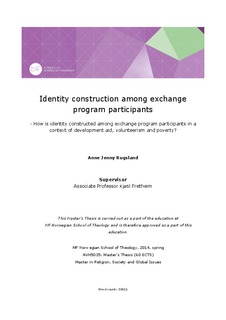| dc.description.abstract | My main object in this thesis is to look at how participants of the Communication for Change exchange program perceive and construct their identities in a context of poverty, development aid and volunteerism. Communication for Change is a joint program by Norwegian Church Aid and Norway’s YMCA/YWCA, and they claim that the participants will be challenged and changed during the exchange. In this thesis, I question whether the informants perceive their identity differently after their time in a developing country. Identity construction is a challenge for young adults, especially in our post-modern society. Their identity is influenced by social structures, such as culture and media, and many struggle to find their own voice in a time where everything and everyone’s opinion is readily available. It has become very popular to go on a volunteer exchange in the global South. In recent years, organizations have created new programs in order to attract young adults, and it is interesting to look at how an exchange can influence the identity of young people.
I have done a qualitative study where I have used a semi- structured interview. The informants were strategically selected since I, due to time considerations, needed informants who were doing a four-month exchange. Through a subsequent analysis, I have made some interesting discoveries on how the identities of the informants are influenced by the exchange in a developing country. My most interesting find is that, to a large degree, the exchange does not seem to have influenced how the informants construct their identity. However, a common sentiment from the informants was that they expressed belief that they would utilize their experiences later in life, but they were unable to say to what degree. Also interesting to note is how the informants had three different motivations for going on the exchange; travel, helping others and learning. For many, the element of traveling was the most prominent, and it is therefore relevant to discuss how the exchange can be viewed as a mix of volunteering and tourism. I believe that the informants went on the exchange in order to experience a new and different part of the world as tourists, but also with a hope of being able to do something they would consider important.
Based on the interviews, I have looked at a set of theories on poverty, development aid and volunteering which I will present in this thesis. However, it is important to note that it is an empirical study first and foremost. | nb_NO |
